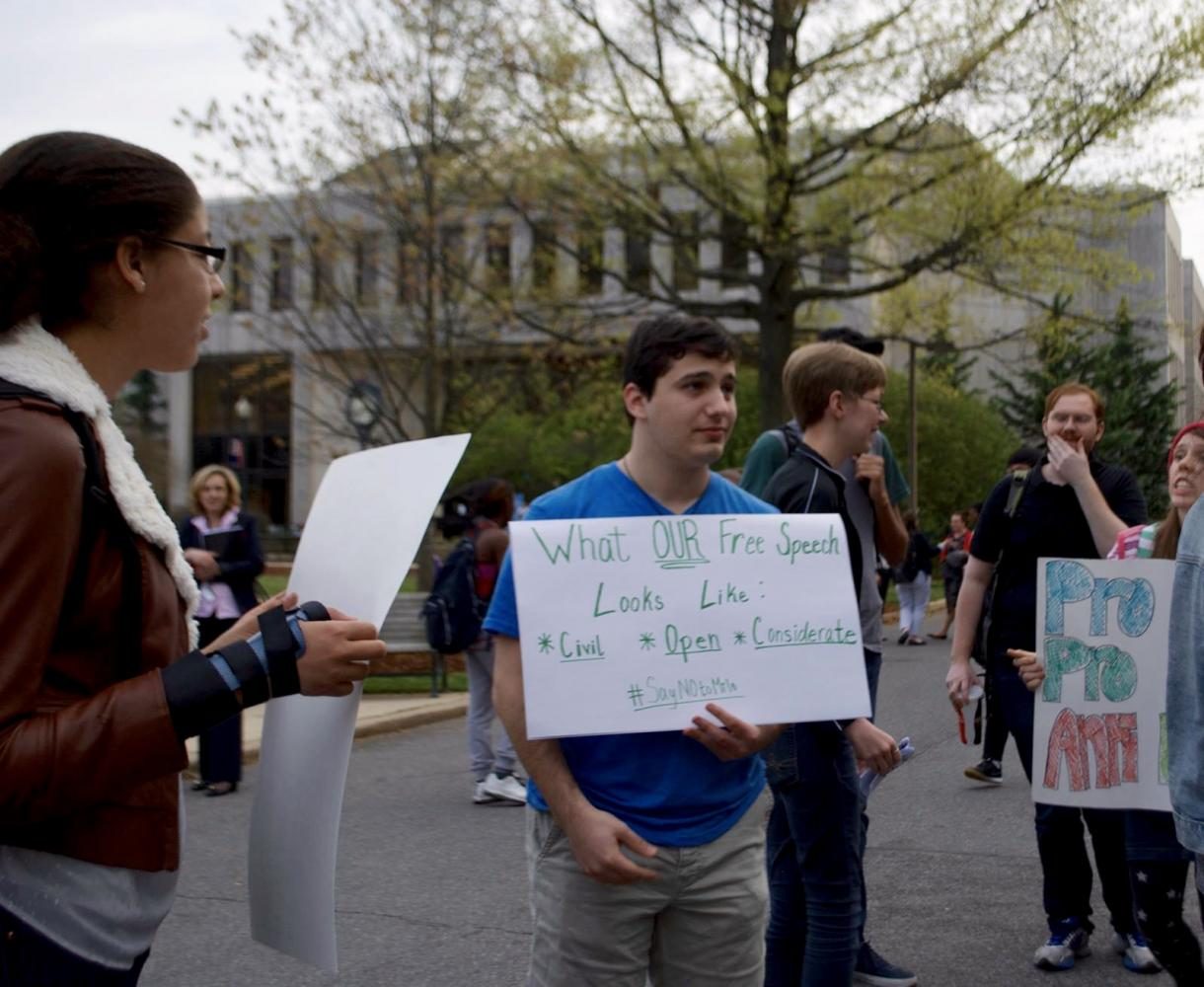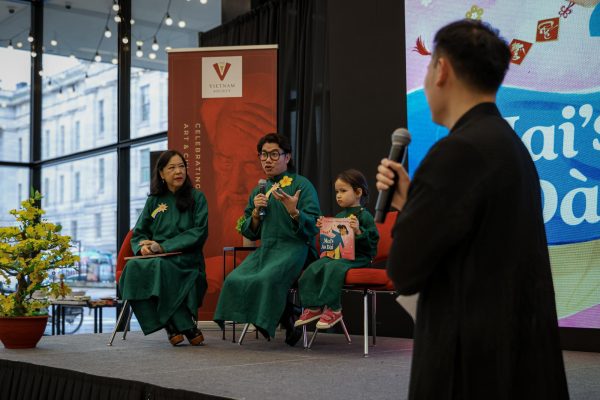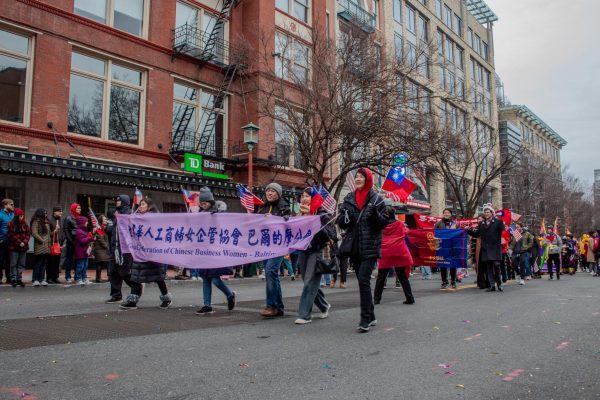Milo Yiannopolous Speaks at AU, Draws Out Heated Reactions from Students
An hour before Milo Yiannopolous, Breitbart editor and self-proclaimed “professional provocateur,” would give his American University lecture on freedom of speech, social movements and Islam, long lines for the event were already forming inside Mary Graydon Center. Protestors were already gathering outside the building.
People waiting in line looked from the windows as protestors began chanting and cheering with organizer Noah Leibowitz and those of The Darkening movement.
At least 150 protestors came to the event, a number that Leibowitz did not expect. She expressed her surprise as she spoke over a megaphone to those who came.
“We are not avoiding dialogue by refusing to entertain this event,” Leibowitz said.
Noah Leibowitz, who identifies as transgender, held a sign that said, “Milo Wants Me Dead,” a reference to one of Yiannopolous’s articles where the journalist wrote, “If you ask me, when a guy says he needs to cut part of himself off for the world to make sense, we should start with his head.”
She briefly talked about how a Yiannopolous follower had tweeted Leibowitz’s full name and twitter profile to harass her.
Leibowitz claimed in her speech that the protest was not about AU’s Young Americans for Liberty, the organization that brought Yiannopolous to campus, but about AU’s administration for providing Yiannopolous a platform and continuing to ignore the needs of marginalized students on campus.
“Our struggles are real, the violence that we face is real, and while Milo may be here to tell us otherwise, we refuse to let him speak without consequence,” Leibowitz said.
Meanwhile, the lines inside were beginning to move as doors opened. The room reserved for the event was full of students from American University and others from the surrounding universities and the DC area. Students from the YAL chapter at Rutgers University, where Yiannopolous spoke in the past, also came to support AU’s chapter.
Rebecca Rahman, a freshman studying international relations at AU, was one of the first people in line and the last to speak during the question and answer portion of the event.
She described how nervous she felt being there and the “dirty looks” that she received while waiting in line.
“I felt a deep sense of shame and embarrassment because it was at the point that I wanted to shout, ‘I’m a liberal, I don’t believe in any of this,’” she said. According to Rahman, she was there to observe, to listen and to understand.
Some event-goers carried signs that supported Donald Trump and wore hats that said “Make American Great Again.” Throughout the event, crowd members would chant “Trump” and “Build a wall” at those who disagreed with or interrupted Yiannopolous.
As a Muslim and the daughter of two war-surviving immigrants from Bangladesh, seeing the Trump supporters made her nervous. Her anxiety came in part from an interview Trump did on CNN where he said he believes “Islam hates us [America].”
Rahman felt anxious and her anxiety only rose as the night went on. During the event, she watched as a young black woman was escorted out after standing up and shouting at the audience and Yiannopolous. Rahman heard someone shout, “Kill them all” as the woman left.
She watched as Stephanie Black, a student who silently held up a sign for the whole two hours of the event, saying “free speech [does not equal] hate speech.” Part of the crowd cheered her on while others booed her.
Her anxiety rose yet again when the woman in front of her during the Q&A was ridiculed by both Yiannopolous and the audience for her second question about his credentials to talk about the experiences of marginalized communities.
Yiannopolous deemed the question “too buzzwordy” and refused to answer it. He did, however, answer the first question regarding immigration and its effects on the marketplace of ideas.
When it was finally Rahman’s turn, she worded her question carefully.
“On the idea of reformation, do you believe that Islam has potential for reformation?” She asked. She continued to lay the foundation of her question, referring to his articles about the threat of “mass Muslim immigration” and to recent events where Muslims had been killed in the West for their beliefs.
She did not expect Yiannopolous nor the crowd to receive her question well on whether or not Islam has a chance at reformation, and that blanket statements about Muslims often result in negative situations, such as the Chapel Hill shooting involving the deaths of three Muslim college students.
In his answer, Yiannopolous cited his own concerns as a British gay man and his own fears of the migration problems arising in Europe. In his answer, he mentioned that over 50% of British Muslims believe that homosexuality should be outlawed and that 39% of British Muslims believe that their wives should always listen to their husbands.
The statistics he provided came from a recent survey of British Muslims by ICM. Its methodology has been questioned by the Muslim Council of Britain, as according to the New York Times, the sample group of 1,081 Muslims were largely from disadvantaged communities in Britain and could not be considered indicative of the British Muslim community nationally.
Rahman said that she didn’t agree with everything that Yiannopolous had said, but that she understood his position.
After Yiannopolous finished his answer, disruption occurred when a young man who disagreed with Yiannopolous rushed the microphone, but had it taken from him.
Yiannopolous said the event was over and offered the young man a chance to speak with him after. Protestors in the room shouted at Yiannopolous in response and the crowd shouted back, creating chaos for a few minutes.
Rahman said in the microphone that this was not a way to end the event. The crowd cheered in response and Yiannopolous finished the lecture. He met with students after the lecture.
“There wasn’t a genuine attempt to listen to what [Yiannopolous] had to say,” Rahman said.
She pointed out that Yiannopolous said that he believed African Americans were owed something from slavery when answering a question about the Black Lives Matter movement, even though he disagrees with the movement on the record.
“People are dynamic and so are their views,” Rahman said, “If you paint them in these static portraits, you don’t give them a sense of animation, of true humanity, in which they will change, or, most importantly, have room to listen and to debate.”
AU through the 2015-2016 academic year has hosted a variety of speakers with widely different political views. Rahman believes it is up to people to go out of their way to find those that disagree with them to escape an echo chamber of like but unchallenged opinions. That goes for both sides, she said.
However, according to Rahman, both sides must be cautious of its use of mockery and satire, especially when it begins to threaten someone’s safety.
When Rahman’s father immigrated to the United States, he experienced culture shock and had to adapt to a new way of thinking. His process, she said, had been passed down to her: listen to dissent and understand where it is coming from before judging at all.
“You’re going to be uncomfortable, you’re going to be angry,” she said. “But it can do a world of difference, just by listening.”












